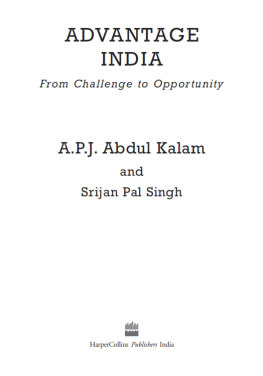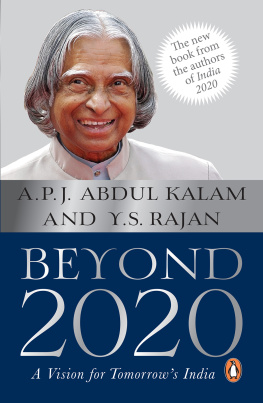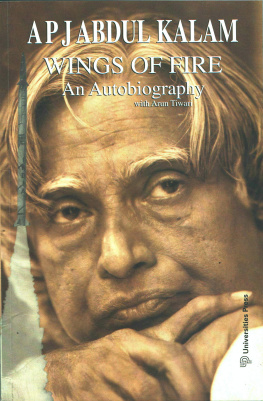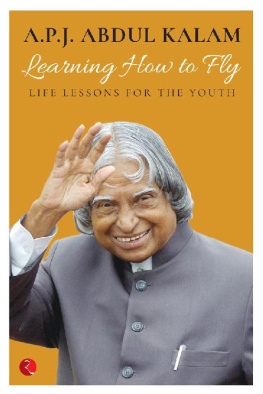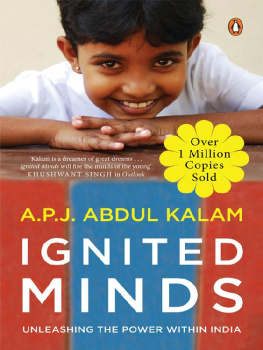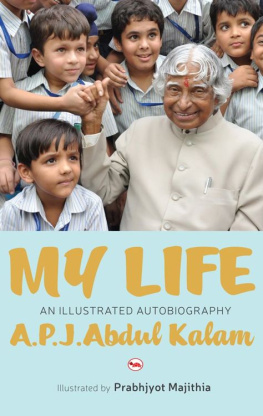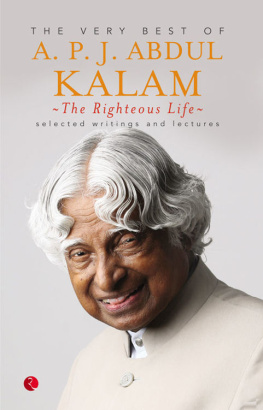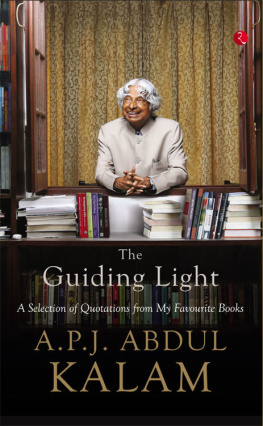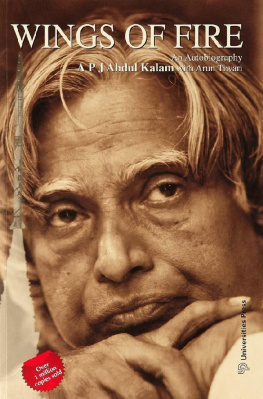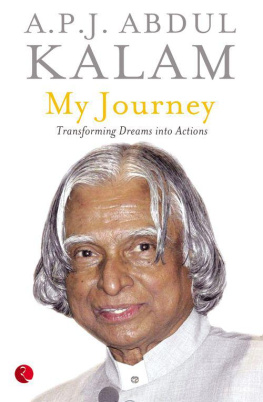A.P.J. Abdul Kalam. - Turning points : a journey through challenges
Here you can read online A.P.J. Abdul Kalam. - Turning points : a journey through challenges full text of the book (entire story) in english for free. Download pdf and epub, get meaning, cover and reviews about this ebook. City: New Delhi, year: 2011, publisher: HarperCollins Publishers India, genre: Politics. Description of the work, (preface) as well as reviews are available. Best literature library LitArk.com created for fans of good reading and offers a wide selection of genres:
Romance novel
Science fiction
Adventure
Detective
Science
History
Home and family
Prose
Art
Politics
Computer
Non-fiction
Religion
Business
Children
Humor
Choose a favorite category and find really read worthwhile books. Enjoy immersion in the world of imagination, feel the emotions of the characters or learn something new for yourself, make an fascinating discovery.

- Book:Turning points : a journey through challenges
- Author:
- Publisher:HarperCollins Publishers India
- Genre:
- Year:2011
- City:New Delhi
- Rating:3 / 5
- Favourites:Add to favourites
- Your mark:
- 60
- 1
- 2
- 3
- 4
- 5
Turning points : a journey through challenges: summary, description and annotation
We offer to read an annotation, description, summary or preface (depends on what the author of the book "Turning points : a journey through challenges" wrote himself). If you haven't found the necessary information about the book — write in the comments, we will try to find it.
Turning points : a journey through challenges — read online for free the complete book (whole text) full work
Below is the text of the book, divided by pages. System saving the place of the last page read, allows you to conveniently read the book "Turning points : a journey through challenges" online for free, without having to search again every time where you left off. Put a bookmark, and you can go to the page where you finished reading at any time.
Font size:
Interval:
Bookmark:

Challenges
A.P.J. Abdul Kalam

HarperCollins Publishers India
a joint venture with

New Delhi
CONTENTS
M y book Wings of Fire covered my life up to 1992. Ever since it was published in 1999 the response has been astounding and the book has sold more than a million copies. More heartening still is that it appears to have made a positive impact on thousands of people, helping them change their lives for the better.
As I wrote Turning Points the thought occurred to me why I was writing the book. One could say that my story echoes the concerns, anxieties and aspirations of many Indians. Like them I started my life from the lowest step in the ladder. My first job was as senior scientific assistant. Gradually I moved up to greater responsibilities, finally assuming the office of the president of India. Certainly much has happened in the past decade and more which needs recounting. One could say that it has been a very intense experience.
However, my reasons for writing Turning Points were slightly different. Seeing the response generated by Wings of Fire I felt that if in the same way this book too could benefit a few people it would be well worth the effort. In fact, if even one person or one family find their life changing for the better because of something gleaned from this book, I will feel fulfilled. Hence this book for you, dear reader.
A.P.J. ABDUL KALAM
30 May 2012
New Delhi
Keep loving nature and care for its blessings
Then you can see divinity all over
I t was 24 July 2007, the last day of my presidency. It was a day filled with many engagements. In the morning I was busy with personal work. Later in the day, starting from 3.25 p.m., there was a short interview with Rajdeep Sardesai and Dilip Venkatraman from CNN-IBN, followed by a meeting with E.S.L. Narasimhan, governor of Chhattisgarh. After this I was to meet Dr Ramesh Pokhariyal Nishank, minister of health and family welfare and science and technology, Uttarakhand. There was a meeting with Ms Charishma Thankappan, a student of Delhis Hindu College, along with her parents and five others, and then at 4.00 p.m. with Sunil Lal, chief of protocol, Ministry of External Affairs, along with his wife, Gitanjali, and their daughter, Nitika. And so it went with several other farewell calls until 8 p.m., when I was to host a dinner for the President-elect, the Vice President, the Prime Minister and the Council of Ministers.
In all the round of farewells and meeting callers, speaking to friends and seeing to it that my few belongings were packed the two suitcases, so to say, that I had said was all I would take away with me there was an unspoken thought that was in the air. Whosoever met me or talked to me had one question uppermost in their mind: What would I be doing? Had I worked it out? Would I go back to teaching? Would I retire from active life? Unlikely as this last was to anyone who knows me. For now the last five years at Rashtrapati Bhavan were fresh in my mind. The welcoming flowers of the Mughal Garden, where Ustad Bismillah Khan gave his last performance and many other musicians also performed, the fragrance of the herbal gardens, the dancing peacocks, the guards who stood alert under the hot summer sun and in the biting cold of winter all had become part of my daily life. What a rich experience these five years had been!
People from every field and walk of life had poured out their ideas for the development of the nation to me. They vied with each other to tell me how they had contributed their mite. Politicians at every level shared their vision for developing their constituencies. Scientists showed their hunger to help solve pressing issues. Artists and writers expressed eloquently their love for India. Religious leaders shared a common platform to speak on spiritual harmony and unity of minds. Specialists from different fields shared their thoughts on building a knowledge society. The legal and judicial communities frequently offered their ideas on many current topics like fair treatment for all citizens, fast-track disposal of cases and e-judiciary. The non-resident Indians whenever they met me, showed a desire to give back to the country of their birth whatever they could to see it develop and improve.
My visits to different parts of the country always provided me with unique experiences, which made me understand the aspirations of the people, the good work done by many, and above all, the power of the youth.
My interaction with the medical fraternity was wide-ranging, be it in their efforts to extend affordable medical care to every rural citizen, encourage research, ease the life of differently abled people, promote the care of senior citizens or spread the message of lifestyle changes for preventive health care. Nurses who met me both in India and abroad volunteered to set up centres of high quality care, particularly for people in villages.
My interactions with farmers, including cotton farmers in distress, enabled me to understand the problems and challenges they face and helped me formulate and convey my ideas to agricultural scientists.
My meeting with postmen triggered the thought that the postal system could play a pivotal role in a knowledge society with postmen becoming knowledge officers in rural areas.
Policemen met me and gave their ideas on police reforms, improving police station infrastructure and the application of information technology to police functioning, ideas which I could share in the forum considering police reforms.
The panchayat presidents, particularly the women presidents, explained their plans and programmes for improving their villages and the hurdles they faced.
Wherever I went, teachers assured me that their mission was to groom the youth for nation building. They would strive to impart values to the young which would help them become enlightened citizens, they said.
All these enriching experiences culminated in the design of oaths, which summarized the desirable actions to be taken by each segment of the society, whether it be children, parents, teachers, Servicemen, administrators, lawyers, doctors, nurses, or others. The administration of the oaths became part of the interaction with different groups of people. Generally these oaths comprised five, seven or ten points pertinent to that section of society. The gatherings were normally large, and the recitation of these oaths brought the entire audience together in a common purpose and conveyed a message that they could all carry with them through their lives.
One of the features that never ceased to astonish me was the sheer volume of letters, emails and other correspondence that used to arrive while I was president. The letters were from children, youth, adults, teachers, scientists just about everyone. Unbelievably, there were thousands of letters every day. It was not possible to answer all the queries or to provide the kind of help required. But we tried. In many cases we forwarded the letters to the officials concerned for further action. If it was for medical treatment we tried to suggest a suitable hospital. At other times we pitched in with advice or suggestions ourselves. Even at times with a small monetary assistance. It was astonishing how in all the optimism, faith and hope that the letters showed our countrymen as possessing, there were also these vast islands of suffering, pain and destitution. One letter that touched me came from a young girl whose family was in straitened circumstances. Somewhere in that haunting letter I sensed a spirit and an ability to change her life for the better. We forwarded her letter to someone we thought might be able to help, with surprising consequences.
Next pageFont size:
Interval:
Bookmark:
Similar books «Turning points : a journey through challenges»
Look at similar books to Turning points : a journey through challenges. We have selected literature similar in name and meaning in the hope of providing readers with more options to find new, interesting, not yet read works.
Discussion, reviews of the book Turning points : a journey through challenges and just readers' own opinions. Leave your comments, write what you think about the work, its meaning or the main characters. Specify what exactly you liked and what you didn't like, and why you think so.

